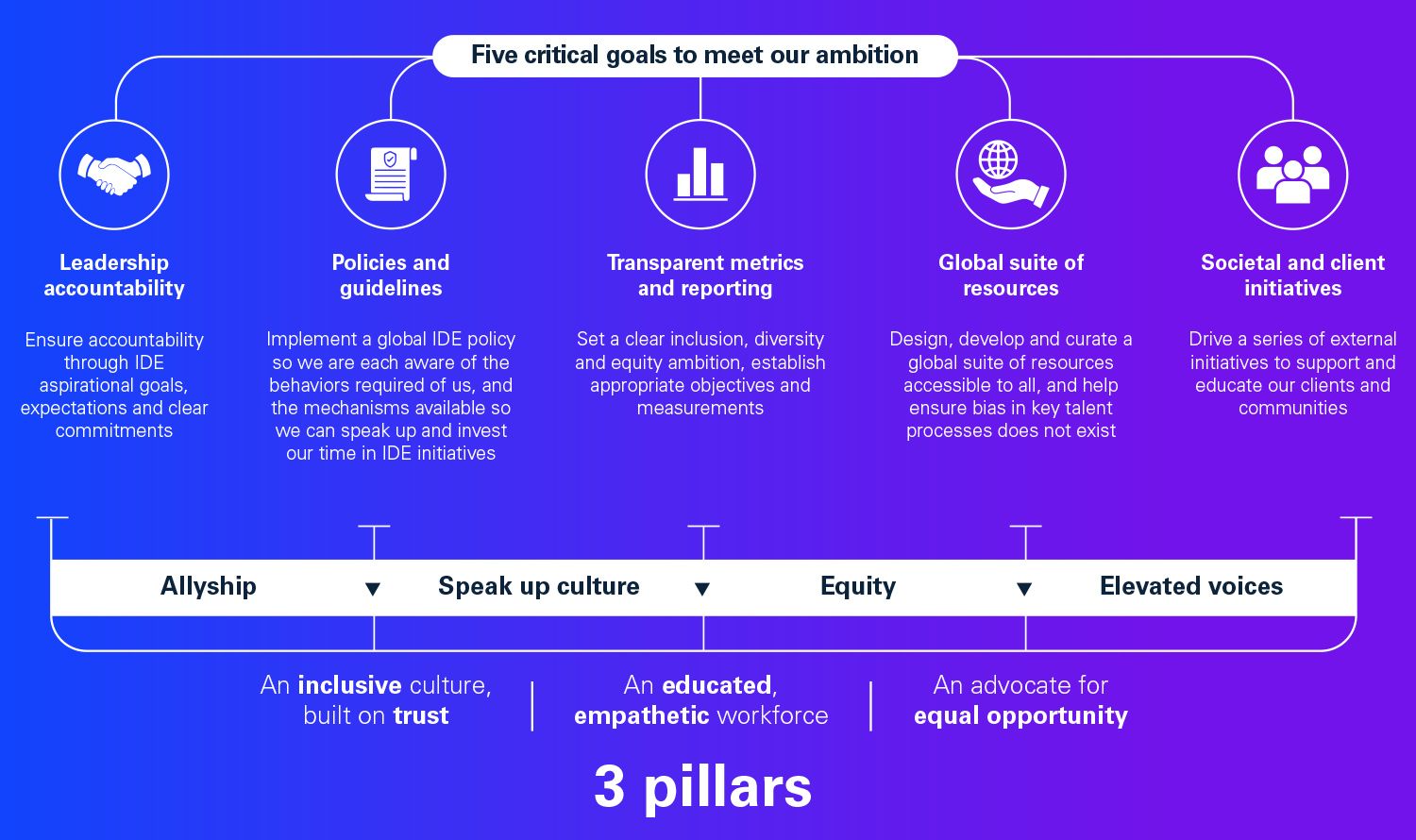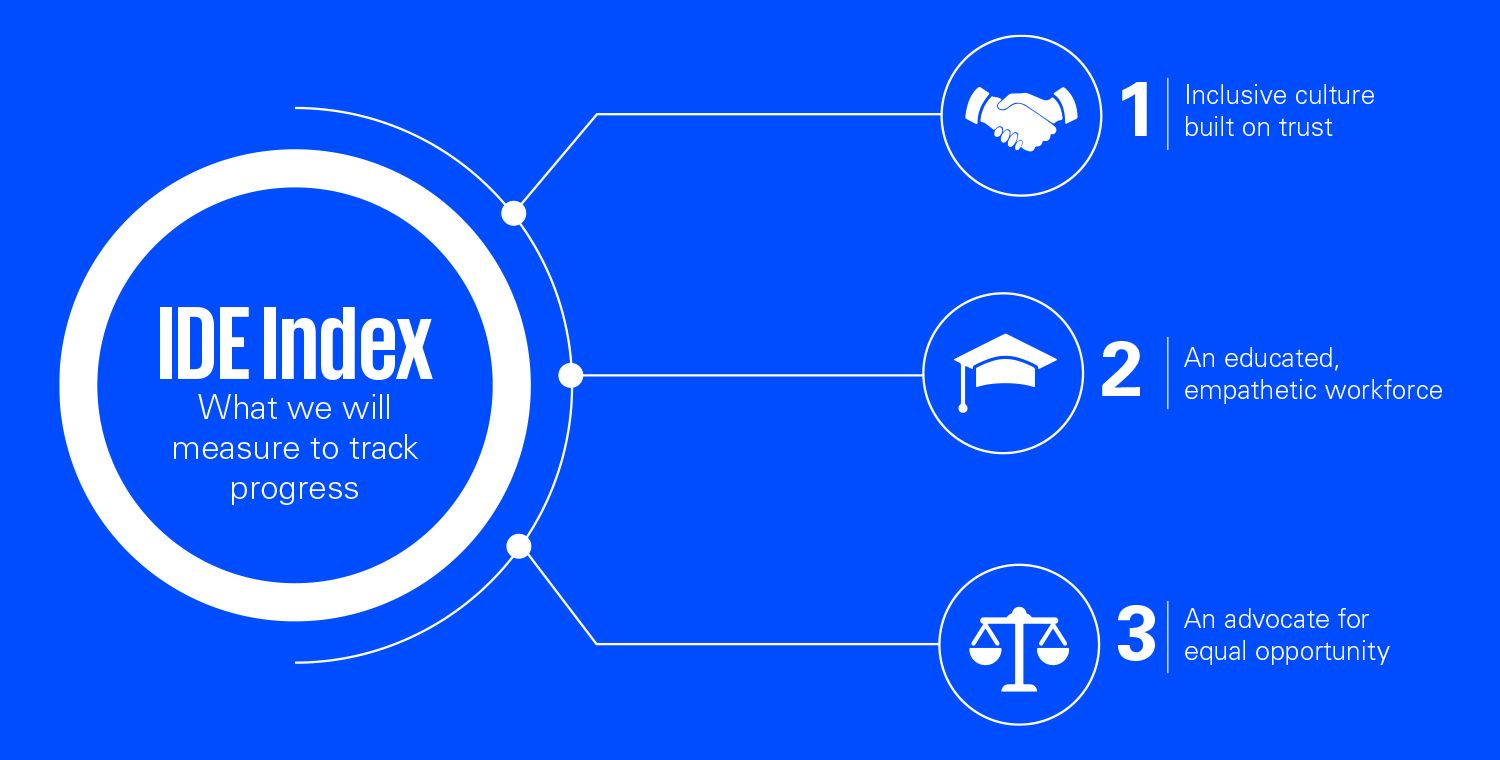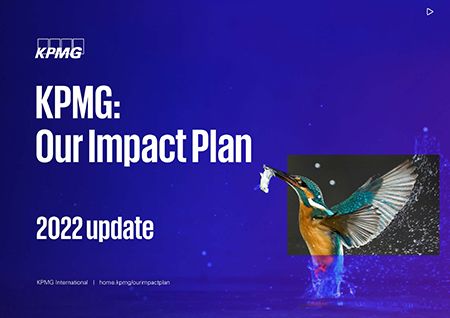Climate change, the COVID-19 pandemic, racial injustice and growing inequality continue to disrupt all aspects of life. Workforce attrition is at an all-time high, particularly among minority groups.
We’re committed to building future-proof skills, expertise and innovation and equipping our people to grow their careers and make an impact with work that matters. As we define, shape and build a workplace fit for the future, we’re involving our people every step of the way.
Engaging our people is vital to driving our agenda and we’re encouraged by our 73 percent response rate to our latest Global People Survey (GPS). We also gain valuable insights from groups including our Global People Steering Group, composed of People Leaders from our largest KPMG firms and regions, as well as our Next Generation Council, a diverse group of young KPMG leaders.
Preparing for the future means investing in our people’s health and well-being, providing and supporting hybrid ways of working, in an inclusive environment, and upskilling our talent in areas such as technology and ESG — focusing on meaningful learning that will last a lifetime.
Our commitments

Inclusion, diversity and equity (IDE)
- Have an inclusive culture, built on trust
- Foster an educated, empathetic workforce; and
- Advocate for equal opportunity

Health and well-being
- Protect the health of our people — both physically and mentally — and enable them to be effective and productive

Continuous learning
- Develop a continuous learning culture

Human rights
- Respect human rights
Inclusion, diversity and equity (IDE)

What makes us different is also what makes us stronger. Building a welcoming culture where everyone feels safe and empowered can allow our people to reach their full potential, and ultimately help drive success.
Fostering an inclusive culture built on trust
This year, in collaboration with KPMG firms around the world, we added equity to the title of our IDE agenda.
How we define inclusion, diversity and equity at KPMG
Inclusion is about belonging
We commit to creating a safe environment built on trust; where we can bring our true authentic selves to work and feel valued for our unique contributions and perspectives.
Diversity is about difference
We commit to embracing and respecting the variety of unique experiences, cultures, identities and perspectives we collectively bring to KPMG.
Equity is about access to opportunities
We commit to standing against systemic barriers and biases. We help level the playing field and ensure everyone can succeed and thrive at KPMG.
Integrating IDE throughout the organization
Leveraging our people’s input, we created and introduced KPMG’s Inclusion, Diversity and Equity (IDE) Collective Action Plan, which sets out the steps we’ll take to drive IDE across the global organization and within the communities we’re proud to serve.
Our IDE Collective Action Plan
Click here to view larger version
We’ve built a Global IDE Center of Excellence (COE) and rolled out a new global IDE policy that will enable us to deliver our IDE Collective Action Plan and we’ve developed a milestone tracker, to drive accountability. The objective of the policy is to ensure that all our people, wherever they are in the world, feel safe and empowered at work.
My hope is that every single one of our KPMG people around the world can act as allies to one another and feel comfortable bringing their whole selves to work. Because that’s when our people can truly shine and in turn, bring excitement, innovation and passion to our colleagues, clients and communities.
Building an educated, empathetic workforce
We provide global IDE eLearning courses to all our people that cover topics like inclusive leadership, overcoming implicit bias and inclusive hiring. In FY22, our ambition is to deploy educational resources and learning programs to all our people by developing digital global IDE learning pathways.
We’ve developed a program of strategic learning events, with a strong focus on allyship and building a speak-up culture. KPMG hosted global summits for PRIDE, International Day for the Elimination of Racial Discrimination, International Day for Persons with Disabilities and International Women’s Day. The summits drew participation from more than 11,000 KPMG people in 60 countries and territories.
In addition, we’ve created an allyship guide aligned to our Values to provide our people with the tools they need to foster a supportive and inclusive workplace.
Advocating for equal opportunity
To help ensure our people, particularly our leaders, are held responsible for change we’ve developed and embedded new IDE goals across the global organization. Each year, all our people are encouraged to set an IDE goal as part of their performance management, to help build a diverse and equitable organization that’s inclusive to all.
Broadening our focus on ethnicity, LGBTQ+ and persons with disabilities
We’ve committed to broaden the scope of the global diversity data we collect and report on. Where we’re unable to set collective quantitative goals at the global level, we will propose actions that will help strengthen our approach to IDE across our member firms and expand our focus to include ethnicity, LGBTQ+ and persons with disabilities.
KPMG in the UK, US, Canada and Australia are already making progress in this area, with wider representation from these groups. And as KPMG firms strengthen the collection of their people and diversity data, we will set a baseline for moving us forward, globally.
A number of KPMG firms have been leading the way in setting goals for the future. For example:
- KPMG in the UK has committed to 20 percent of its Partners and 25 percent of its Directors being represented by people from an ethnic minority by 2030
- KPMG in the US has an aspiration of 50 percent Partner and Managing Director representation from underrepresented groups, including doubling Black representation by 2025
- KPMG in Canada committed to 26 percent of its Partners being represented by people of color by 2025
- KPMG Australia has committed to 20 percent of its Partners being culturally diverse by 2025
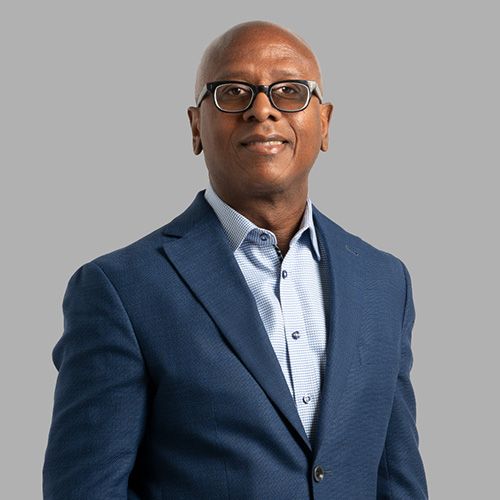
People of KPMG
“Being elected Chair of the Board of Directors of KPMG in Canada has been a long journey since I came to Canada from Jamaica as a young boy. I started at the firm straight out of university, but while my mentors kept saying I was Partner material, when I looked at leaders across the firm, I didn’t see people who looked like me. More and more, a priority is being made at the leadership level to ensure it’s representative of all Canadians. As Chair of the Board and KPMG in Canada’s Chief Inclusion, Diversity & Equity Officer, I have the opportunity to make sure my perspective and lived experience — which is shared by millions of Canadians across the country — are heard and considered during the decision-making process. These roles have not only given me a seat at the table but allowed me to lead by example as a champion of inclusion and diversity; it sends a pretty powerful message to people across the firm.”
Rob Davis
KPMG in Canada
We have developed a new IDE Index which will provide a way for us to track and measure our progress against our IDE Collective Action Plan in a consistent way. This is in place to hold us accountable as well as track and measure our progress.
Closing the gender gap
We’ve carried out research on gender pay equality methodologies and legislation in our Global Board countries. Our approach is not only about numbers; it’s also about understanding the processes and programs that drive our metrics and ultimately build a more inclusive and equitable culture. By having a clear picture of our current state, we can set realistic goals and measure our progress.
While we’re making progress for a more equitable future that includes everyone, there’s still more to do. To level the playing field, we’re investing in new programs and initiatives that support women across the world.
In 2021, KPMG took steps toward gender diversity, with females making up 48.4 percent of our total headcount1 — an increase of 0.5 percent since last year. More specifically, our leadership group, composed of Partners and Directors, has had an increase of 0.9 percent.
KPMG’s commitment to gender equality
Read more about KPMG’s commitment to gender equality here.
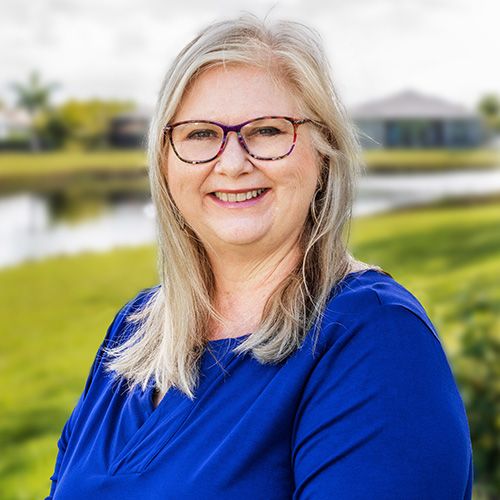
People of KPMG
“I’ve received valuable advice from women I’ve worked with over the last 30-plus years, but when one of my mentors, a very successful female CFO, told me that her “failures” had played as important a role as her successes as she built her career, it got me thinking. Many women I speak to have experienced low confidence and fear of failure, but we all agree that overcoming obstacles and taking risks are part of the journey to finding success. I had to do something, because when women feel comfortable sharing their stories of failure and success, it empowers others to do the same — and that’s where the real learning happens. So, I began organizing ‘confidence and risk-taking’ workshops for female professionals and have now hosted over 65 workshops for more than 12,000 women in 10 countries and territories. I’ve seen first-hand how participants benefit from honest, real-life stories about how deliberate risk-taking helps us overcome our fears and grow in confidence. The more women share their lived experiences, the safer a space they create for others to follow suit.”
Laura Hay
KPMG International
Advancing gender equality
We’re working with KPMG firms to set goals that will help drive our commitment to advancing IDE across our global organization.
Globally, it is our intention to achieve 33 percent female representation by 2025 at the leadership level, which includes Partners and Directors. This represents a third of our leadership across the globe and will help drive our commitment to advancing gender equality, across all KPMG member firms.
Moving forward, KPMG is committed to inclusivity and better monitoring gender beyond the binary.
Joining global voices
Each year, we review our external coalitions and commitments to ensure we’re continuing to build relationships with organizations that share our Values and align with our IDE strategy. This year, KPMG:
- Worked with the UN to deliver on our commitments as a signatory to the UN Global Compact Principles and UN Women’s Empowerment Principles — including working with our member firms to progress gender equity using a gender gap analysis tool
- Became a signatory to the World Economic Forum’s Partnering for Racial Justice in Business — aligned with our goals of expanding the scope of the global diversity data we collect and report
- Continued to support LGBTQ+ equality through our membership of the Out Leadership Global LGBTQ+ Business Network — where we sent KPMG LGBTQ+ emerging leaders across the globe to the 2021 OutNEXT leadership program, co-sponsored WorldPride in Copenhagen, and worked closely with the Chair of KPMG’s Global Pride Network
- Became a signatory to The Valuable 500 and committed to conducting a current global state analysis of disability inclusion efforts in order to share best practices, drive next steps and demonstrate our commitment to disability inclusion
Health and well-being

Everyone deserves strong and accessible support, and we put our people’s physical and mental health first. It’s our goal to lead the industry in developing employee well-being, fulfilment and flexible ways of working.
Supporting physical and mental health
Throughout the pandemic, we know that the demands placed on our people in both their personal and professional lives have at times felt overwhelming.
KPMG offers a robust Employee Assistance Program that’s customizable to individual needs.
Additionally, all Global Board countries continue to provide an employee assistance offering that includes mental health and well-being support.
Case study: Be you, be well, KPMG Australia
KPMG Australia’s well-being program ‘Be you, be well’ is centered on an integrated and holistic approach focusing on mind, body, connections and finance — intent to empower our people to achieve their optimal level of happiness, well-being and performance in and outside of the workplace. Scaling up well-being efforts has taken on new momentum and demand since the start of the pandemic, allowing KPMG Australia to take initiatives to the next level. The program is equipping leadership to really lean into mental health conversations with workshops and toolkits that aim to reduce the stigma associated with mental illness, allowing leaders to support with greater confidence. It is equally as important to equip peers with the confidence to support one another. Instituting the peer support and well-being circles by accreditation is building capabilities (beyond just HR) for true peer-to-peer connection. ClubWell — a program that connects our people — was also expanded and now has over 4,000 members. It now includes clubs of various interests and hobbies such as a book club, money matters, green champions and more, all building connection and a sense of belonging among like-minded people and leaders.

People of KPMG
“I first experienced clinical depression over 15 years ago. It was so acute that for months, I’d struggled to eat or sleep and all I could think was that I was letting my team down. I tried to resign thinking my depression was influenced by work, but my office Managing Partner at the time told me we’d get through this together. Fast forward and I’m now KPMG in Canada’s Chief Mental Health Officer — the first position of its kind in the country. My job is to break the stigma surrounding mental health and to open boardroom doors — to make sure that our employees know that mental health is health, that nobody has to suffer in silence and that asking for help is the first step to recovery. My goal is for mental illness to be treated just the same as a physical illness, like cancer, and taken just as seriously. A world where we can talk openly about mental health while standing at the water cooler is within reach. I see proof of that every day.”
Denis Trottier
KPMG in Canada
Building resilience and adapting to an emerging new reality of work
KPMG developed global principles for hybrid working and provided training and guidance to help our people work successfully in this new environment. We’ve created a digital workplace by providing enabling technology and tools that encourage productivity, connectivity and collaboration. In our latest Global People Survey (GPS), we were pleased to see 81 percent of those who responded reporting that they have the tools and resources to help them do their work.
Our office spaces are being redeveloped to create welcoming physical spaces, which enhance team working. To support the physical safety of our people, KPMG continues to follow local guidance on office openings, helping to ensure space is secure and hygiene measures are in place.
We continue to build a future-focused People strategy, supported by our new Collective Employee Value Proposition — aimed at ensuring that we continue to enable our people to thrive as the world of work evolves.
People of KPMG
“I immigrated to the US at 3 years old. A year after coming to the US, I was paralyzed and have been using a wheelchair since. I got connected to others with disabilities through adaptive sports after listening to a newly injured quadriplegic speak at my middle school — and loved it! This led to an athletic scholarship to the University of Illinois at Urbana-Champaign (UIUC), where I got to train daily with Paralympians and world record holders. I also earned a bachelor's and master's degree in accounting, which opened the door to a job at KPMG in the US.
When I started as a new hire in January 2020, I was in the midst of training for the Paralympic Trials. I was able to work reduced hours to focus on training in the hope of making Team USA for the 2020 Tokyo Paralympic Games — and I made the team!
KPMG continues to support me with a flexible work environment so I can succeed both inside and outside of the workplace. And I’m still training to make Team USA again in the future.
Yen Hoang
KPMG in the US
Continuous learning

We are empowering our professionals with access to lifelong learning opportunities — to better equip them to innovate, drive impact and develop future-proof skills.
Enabling self-directed learning
2021 marks year one in our 3-year investment in a new global learning technology ecosystem. The goal is to create a seamless and consistent learning environment to provide agile, scalable and measurable learning content to everyone at KPMG, and this technology is now being deployed across the global organization.
Designing for lifelong learning
We design programs to help ensure our employees have the right skills to support their clients’ needs today and into the future. In our 2021 GPS, 79 percent of respondents indicated that KPMG helps with opportunities to learn new skills and development, whereas 84 percent indicated that KPMG people do a good job sharing their knowledge and experience — promoting continued learning that can last a lifetime.
KPMG provides formal mandatory and technical training that enables people to deliver quality work to clients in all our professional services across Audit, Tax & Legal and Advisory. As an example, we’ve also embedded learning into KPMG Clara, KPMG’s smart audit platform designed to facilitate more seamless interactions between KPMG and clients.
And as part of our ESG plan, we’re providing our more than 236,000 people with ESG training to help ensure everyone is empowered to be an agent of positive change — working with leading global academic institution, the University of Cambridge Judge Business School.
Additionally, KPMG is rolling out a multi-year globally consistent digital and data literacy program to all of our people.
FY21 training provided in KPMG large member firms2
Average annual training hours per individual
Average training costs per individual
Human rights

Building on the work we did in 2020 to identify areas of potential child, forced or compulsory labor risk across KPMG globally, we conducted a targeted diagnostic assessment which considered KPMG International’s own processes, systems and controls to manage modern slavery-related risks. The assessment and associated activity we have undertaken provide a foundation for KPMG member firms around the world to mature their processes and practices.
To transparently demonstrate our progress against our commitments, we will report annually on our performance against the three pillars of human rights due diligence as outlined in the UN Guiding Principles on Business and Human Rights.
In 2021, we worked with KPMG Banarra, a dedicated business and human rights consultancy based in KPMG Australia, to assess the alignment of KPMG International’s own policy with good practice human rights due diligence, focusing on modern slavery risk management.
The assessment provided guidance on how to enhance our policy commitment and use it to support KPMG member firms to implement their own modern slavery risk management policy and processes. We are in the process of developing policy guidance for KPMG member firms, a suite of tools and templates to assist with consistently putting the human rights commitment into action.
Footnotes:
1: Headcount reported above based on Partners and staff employed as of 30 September 2021.
2: KPMG’s large member firms are broadly aligned with the 21 member firms represented on the KPMGI Global Board.

